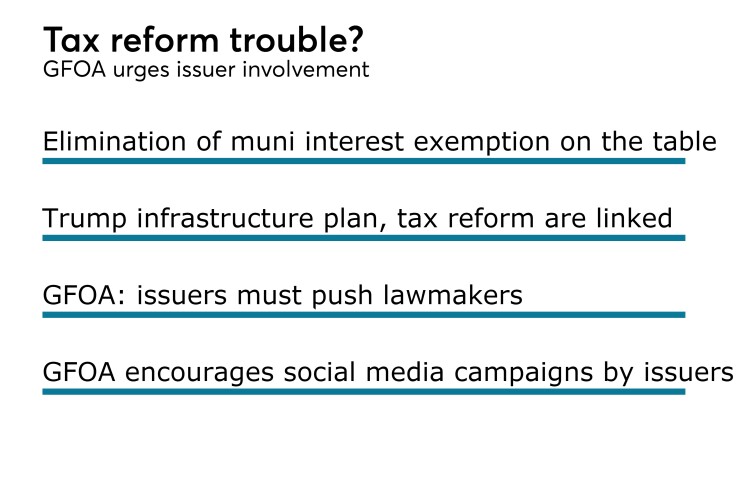DENVER – Comprehensive federal tax reform presents issuers with a lot of uncertainty about whether tax-exempt municipal bonds will remain untouched as a vehicle for them to finance infrastructure projects, something the Government Finance Officers Association wants its members to take to social media about.

Emily Brock, director of GFOA's Federal Liaison Center in Washington, told members of the association’s Committee on Governmental Debt Management Saturday that the tax reform landscape is very uncertain and potentially threatening. Congressional Republicans have said they want to preserve the mortgage interest and charitable giving deductions when they rewrite the tax code, but many other aspects of any eventual tax plan remain up in the air. The exemption of muni bond issuance from taxation could be on the chopping block because it would help Republicans offset the revenue losses they would likely incur with tax cuts.
“I think it is important to keep banging the drum, because until we see comprehensive tax reform, we are still at risk,” said Brock. GFOA and other issuer groups have been doing effective outreach on Capitol Hill, Brock said, and have convinced numerous lawmakers to support the continued tax exemption for muni interest, though many of those legislators have now begun asking questions about the viability of more widespread use of public-private partnerships and other alternatives to traditional muni financing.
“Explore it, but do no harm,” Brock said she has told them.
President Trump made a campaign promise to back a $1 trillion infrastructure investment plan that would focus on P3s, but the infrastructure agenda has become tied up with the tax reform agenda because they are necessarily linked by their impacts on the federal budget.
“It’s kind of a blurred conversation between those two,” said Brock.
Some Debt Committee members complained that the federal government views the term “infrastructure” through an extremely narrow lens and doesn’t understand that virtually all public investment is infrastructure. One committee member said he viewed that narrow focus as a good thing because it might make the federal government less inclined to try to push alternatives to muni bonds for more types of projects.
“The most important thing that GFOA can do is educate our members of Congress,” said Brock, who urged committee members to take to Twitter in defense of the tax exemption. Taking photographs of important bond-financed infrastructure and using the hashtag #builtbybonds could help lawmakers understand the importance of tax-exempt muni bonds in building state and local infrastructure, she said.
“It speaks volumes to Congress, believe it or not,” she said.





